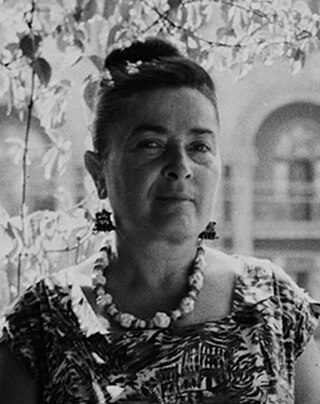
Abdilda Tazhibayevich Tazhibayev was a Kazakh writer, screenwriter, and playwright. He was named a People's Writer of the Kazakh SSR in 1985.
Irina Livezeanu is a Romanian-American historian. Her research interests include Eastern Europe, Eastern European Jewry, the Holocaust in Eastern Europe, and modern nationalism. Several of her publications deal with the history of Romania, Moldova, and Bessarabia. Since 1996, she is associate professor, Department of History, University of Pittsburgh. In 2010–2013 she served as president of the Society for Romanian Studies.
Meta Vannas was an Estonian Soviet politician. She was a member of the Communist Party of Estonia.

A Hill Above the Clouds is a 1987 Croatian autobiographical novel by Vesna Krmpotić. The novel is about a mother who has to come to terms with her four-year-old son being diagnosed with leukemia and efforts to cure him. Globus published a copy of the book in Zagreb in 1989.
Sabrina Grigorian was an Italian-born Armenian actress.

Tuhfa Fozilova was a Tajikistani actress and singer of the Soviet era. During her operatic career, she performed as a lyric soprano.
Aziza Azimova was a Soviet and Tajikistani ballet dancer and actress.
Sona Yazova is a poet from Turkmenistan. In 2010 she was named a People's Writer of Turkmenistan by president Gurbanguly Berdimuhamedow as part of the celebrations marking the 19th anniversary of Turkmenistan's independence. She has also been employed by the national television network. In 2008 she was appointed a member of the committee which metes out the Makhtumkuli International Prize. She has been active in literary circles since the late Soviet era, when she was among those invited to present work in poetry readings during perestroika, and has written short fiction in addition to poetry. She was described as a supporter of the regime of Saparmurat Niyazov while he was alive, and at least one of her short stories centers upon an incident in the life of his mother, Gurbansoltan Eje, whose story was central to his personality cult. Patriotism and love of country are among the themes touched upon in her verse.
Bakhargul Kerimova is a writer from Turkmenistan. She has written both poetry and fiction during her career. A book of her short stories was published in Ashgabat in 1983, and a volume of her poetry was issued in 1988. She has remained active in public life in Turkmenistan since the breakup of the Soviet Union.
Velta Ruke-Dravina was a Latvian-born Swedish linguist and folklorist, as well as a professor in Baltic languages at Stockholm University. Ruke-Dravina's research interests included children's language, language contact, and dialectology. Her doctoral thesis was about diminutives in Latvian. She held the only professorship in Baltic languages outside the Baltics and had a leading role in developing the teaching program on the subject at Stockholm University. In 1980, she was elected as a member of the Royal Swedish Academy of Letters, History and Antiquities.

Fruzina Szalay was a Hungarian poet and translator.
This is a select bibliography of post-World War II English language books and journal articles about the Revolutionary and Civil War era of Russian (Soviet) history. The sections "General surveys" and "Biographies" contain books; other sections contain both books and journal articles. Book entries may have references to reviews published in English language academic journals or major newspapers when these could be considered helpful. Additional bibliographies can be found in many of the book-length works listed below; see Further reading for several book and chapter length bibliographies. The External links section contains entries for publicly available select bibliographies from universities.
This is a select bibliography of post-World War II English-language books and journal articles about Stalinism and the Stalinist era of Soviet history. Book entries have references to journal reviews about them when helpful and available. Additional bibliographies can be found in many of the book-length works listed below.

Anu Kaal is an Estonian coloratura soprano singer. In 2001, she was awarded the Order of the White Star.

Yeranuhi (Yeran) Arshaki Aslamazyan was an Armenian and Soviet artist and graphic artist. She was a member of the Artists' Union of the USSR and an Honored Artist of the Armenian SSR.
Anna Ratkó (1903–1981), was a Hungarian politician (Communist). She was the Cabinet Minister of Health in 1950–1953. She was the first female cabinet minister in Hungary.

Three Chestnut Horses is a 1940 novel by Margita Figuli in the Slovak language.
Mayramkan Abylkasymova was a Kyrgyz poet and editor, designated a "People's Poet of Kyrgyzstan."
Mary Zirin was an American scholar of Russian literature and an advocate for Slavic women's studies, who is remembered for her translations of Russian manuscripts and compilations of bibliographies of Slavic women. Her works, Dictionary of Russian Women Writers (1994) and Women and Gender in Central and Eastern Europe, Russia, and Eurasia: A Comprehensive Bibliography (2007) have become standard references in the field. In the 1980s, she founded the Women East-West newsletter, which became the press organ of the Association for Women in Slavic Studies in 1989. Zirin established a scholarship fund for the Slavic Reference Service of the University of Illinois and with her husband endowed a chair in pulmonary biology in Colorado at National Jewish Health. The Mary Zirin Prize, created in her honor in 1999, is an annual award given by the Association for Women in Slavic Studies to promote independent scholarship.
Judith Pallot is professor emerita of the School of Geography and Environment, University of Oxford, expert in Soviet, East Central European, and Russian geography, in particular, Russia's penal geography and the geography of the Russian peasantry.






